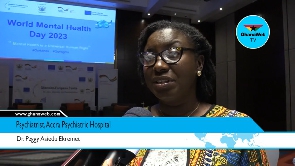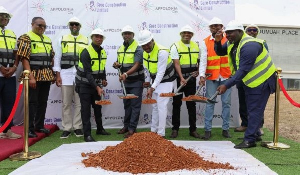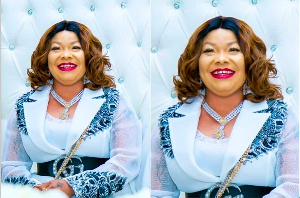A Psychiatrist at the Accra Psychiatric Hospital, Dr. Peggy Asiedu Ekremet, has emphasised the need for a more inclusive and empathetic treatment for patients with mental health illnesses.
She described the discrimination against persons with mental health illness as inappropriate.
Dr. Peggy’s comments came on the back of World Mental Health Day, celebrated on October 10 every year to raise awareness about mental health issues and promote the importance of mental wellbeing.
In an interview with GhanaWeb TV, Dr. Peggy highlighted the alarming prevalence of mental health conditions, especially among the youth and children.
“Currently, globally, one out of every 8 people has a mental health condition. When we come down to the youth, it's about 1 out of every 7 people. In children, 1 out of every 5 children has a recognisable and treatable mental health condition. These statistics are quite alarming because it means that mental illness is closer to us than we think and it can affect everybody,” she stated.
Emphasising the theme for the 2023 World Mental Health Day, which is Mental health is a universal human right, Dr Peggy, noted that just like the other rights, sound mental health is a right and must also be enjoyed by all.
“This year, we want to drum home the point that having good health, which includes having good mental health, is a human right. So, irrespective of your race, gender, locality, social economic status, you need to enjoy an optimum mental health. So just like every human right, mental health needs to be enjoyed.
“Having a mental illness should not deprive you of those rights. I would like to say that in Ghana, we still have a few people who are being chained and shackled because of their mental illness. We are hoping that as we are going on with this campaign, we shall stop these practices and rather bring these people to the hospital for us to collaborate and do the healing and the care that they need,” she said.
She also pointed out some of the challenges facing the mental health sector. They include the lack of drugs and inadequate funding among others.
“Another challenge will also have to do with funding. Because somebody has to pay for mental health and in our Mental Health Act, we proposed the establishment of a mental health fund which currently is not still in place. Even though we receive funding from the government, I believe that more support in that area could be done,” she added.
The Component Manager at the Ghana-European Centre, Micheal Kwaku Yeaboah, who also spoke to GhanaWeb TV, urged the media to prioritise mental health issues in the country.
He explained that with the increasing concerns about mental health, the media should prioritise mental health in its reporting to make it a daily conversation.
“My brief message is to say that issues of mental health are important. We have to focus on it. And we can see there is increasing awareness from the various stakeholders here. We promote including the media as well to prioritise issues of mental health to ensure that we have a much more and improved wellbeing of people,” he said.
World Mental Health Day is celebrated on October 10 to improve knowledge, raise awareness and drive actions that promote and protect everyone’s mental health as a universal human right.
The 2023 World Mental Health Day was under the theme, 'Mental health is a universal human right.'
In Ghana’s case, a recent report by the World Health Organisation (WHO) suggests that about 10% of the population are suffering mental health challenges.
However the country can only boast of three main psychiatric hospitals all in the southern part of the country. They include, Accra Psychiatric Hospital, Pantang Hospital all in the Greater Accra Region and the Ankaful Psychiatric Hospital in the Central Region.
Every year the government allocates only about less than 3% of the total budget to solving the Mental Health issues in Ghana.
Ghana’s leading digital news platform, GhanaWeb, in conjunction with the Korle-Bu Teaching Hospital, is embarking on an aggressive campaign which is geared towards ensuring that parliament passes comprehensive legislation to guide organ harvesting, organ donation, and organ transplantation in the country.
WN/AW
You can also watch the latest episode of Everyday People on GhanaWeb TV below:
You can also watch this GhanaWeb Special on Deadly Trotros:
Health News of Wednesday, 18 October 2023
Source: www.ghanaweb.com













